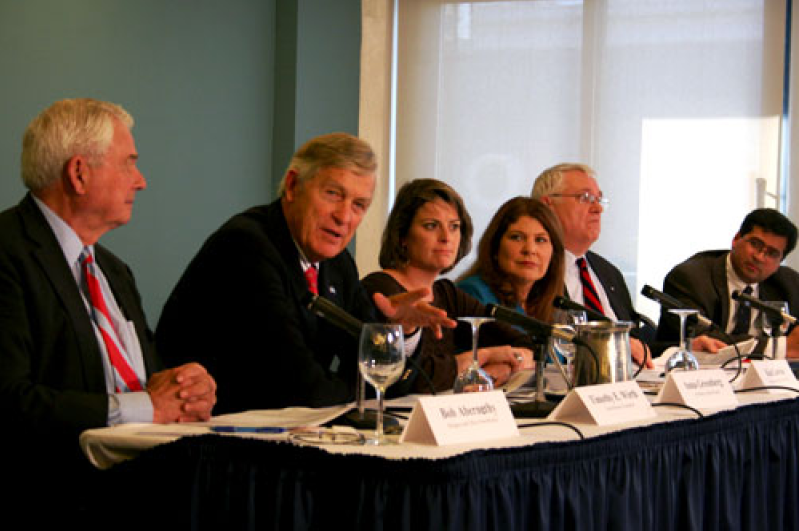
WASHINGTON - Most Americans strongly believe that God has uniquely blessed America, and a similar majority believe that the United States should set the example as a Christian nation to the rest of the world, a survey, released Wednesday, found.
Sixty-one percent agree that America is a nation specially blessed by God, and 59 percent believe the United States should be a model Christian nation to the world, according to a poll conducted by Greenberg Quinlan Rosner Research Inc. for the PBS news program Religion & Ethics Newsweekly and the United Nations Foundation.
Support for the idea that America is uniquely blessed by God was highest among people who attend religious services weekly (80 percent), with 86 percent of evangelical Christians sharing this belief. In comparison, less than half (48 percent) of those who attend religious services less regularly held the same view.
The nationwide survey of 1,400 adults, including an oversample of 400 evangelical Christians aged 18-29, was conducted to find how religion shapes people’s view of America’s role in the world and its foreign policy.
People who strongly believe that America is blessed by God and should set a strong Christian example are also more likely to say that the United States is morally obligated to play a significant role in world affairs.
Overall, most Americans also believe the United States has a responsibility to be very engaged (24 percent) or moderately involved (70 percent) on the global stage. However, most Americans believe (67 percent) the United States’ relation with the rest of the world is on the wrong track.
“Americans remain very interventionist in their views about America’s role in the world and want the U.S. to take an activist role on the world stage,” according to University of Oklahoma professor Allen Hertzke, a visiting scholar at the Pew Forum on Religion and Public Life, in an interview with Religion & Ethics Newsweekly.
But he added, “They want us to be smart about it.”
In terms of foreign policy priorities, there was not much of a difference between what the general American public and what white evangelicals consider most important issues. They both agree that controlling nuclear weapons around the world and fighting global terrorism are the two top agendas for Washington.
There were also no significant differences between the two groups on other issues such as fighting global disease, preventing genocide in countries like Sudan, improving the standard of living in less developed nations, and promoting democracy in other nations.
What the general American public and white evangelicals most sharply contrast on in terms of foreign policy priorities is supporting Israel - 65 percent of white evangelicals consider this extremely or very important compared to 46 percent of the general American public; promoting religious freedom in other nations (67 percent white evangelicals vs. 53 percent); combating global warming (43 percent vs. 59 percent); and providing women with reproductive healthcare (53 percent vs. 60 percent).
Differences can be explained by religious views held by evangelical Christians, who largely see Israel as the birthplace of Christianity and link abortion to reproductive healthcare.
In addition to examining faith groups as a whole, the survey also looked in particular at young white evangelicals.
Results show that white evangelicals in the age bracket of 18-29 are as solidly pro-life on the abortion issue as older evangelicals. But they are more liberal when it comes to granting some form of legal recognition for same-sex couples, whether that be civil unions or marriage.
A majority (58 percent) of younger white evangelicals support giving legal recognition to homosexual couples, while older evangelicals are strongly opposed to the idea.
Also, compared to white evangelicals overall, a smaller majority of younger white evangelicals showed support for Republican presidential candidate John McCain, with 62 percent of younger white evangelicals planning to vote for him. Seventy-one percent of white evangelicals overall plan to vote for McCain.
“We found that young evangelicals are indeed less conservative than older evangelicals on a whole host of very interesting issues,” said Kim Lawton, managing editor of Religion & Ethics Newsweekly at a press conference Wednesday.
“But this is not a group of flaming liberals – at least not yet,” she joked.
The survey was conducted Sept. 4-21, 2008, with a margin of error of +/-3.1 percent for the total survey sample, +/- 4.1 percent for white evangelical Christians, and +/- 5.5 percent for white evangelical Christians ages 18-29.







